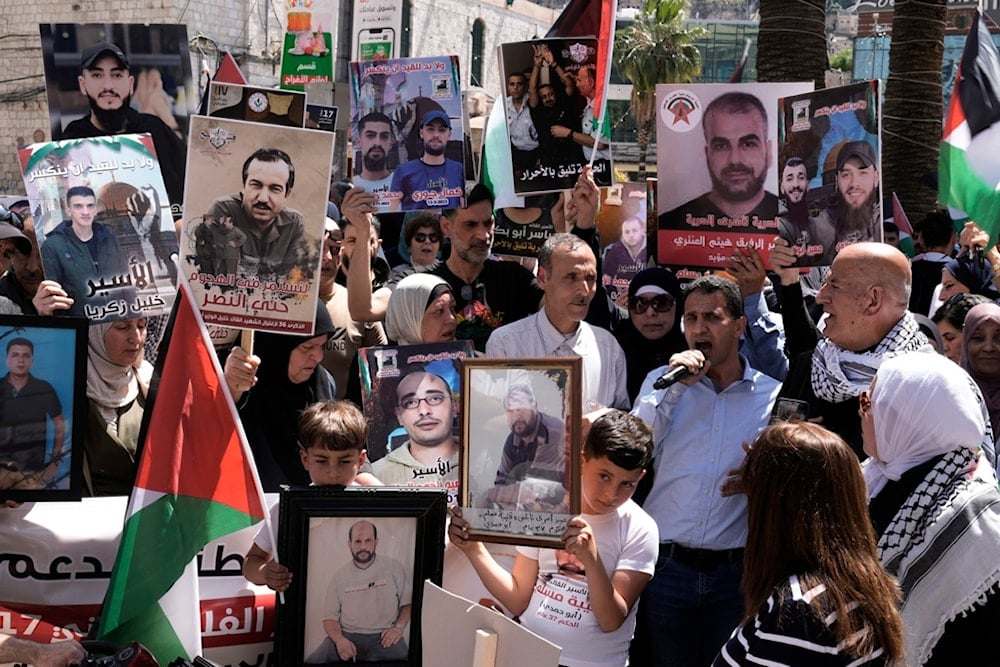Administrative detention turned into life imprisonment: PPS
The Palestinian Prisoners Society underlines that the Israeli occupation's policy of administrative detention has become akin to a life sentence.
-

Palestinians hold photographs of detainees held by the Israeli occupation during a rally marking the annual prisoners' day in the West Bank city of Nablus, on April 17, 2024 (AP)
The Palestinian Prisoners Society (PPS) condemned Monday the Israeli occupation's use of administrative detention, describing it as akin to a life sentence. The organization stated that the occupation authorities "have turned administrative detention into a crime that steals the lives of thousands under the pretext of a 'secret file', keeping detainees indefinitely subjected to this injustice."
In a report published on its official website, PPS highlighted that the issue of administrative detainees has become one of the most significant developments accompanying the ongoing war. As of early January 2025, the number of administrative detainees has risen to 3,376, including approximately 95 children and 22 women. This group represents 32% of the total prisoner population in Israeli jails, which exceeds 10,400 individuals.
According to the PPS, this is the highest proportion of administrative detainees in history, based on monitoring and documentation by human rights organizations. The surge in administrative detention began even before the current aggression and has since escalated dramatically. Prior to the war, there were 1,320 administrative detainees, a number that has now nearly tripled.
The PPS also shed light on the systematic abuses faced by administrative detainees and all prisoners in Israeli jails. These include torture, starvation, medical neglect, and other systematic crimes. Since the war began, 54 prisoners have died in Israeli custody, four of whom were under administrative detention: Omar Daraghmeh, Samih Alawi, Mohammad al-Sabbagh, and Mustafa Abu Ara.
Administrative detention cases typically increase during wars and uprisings in the occupied territories. The occupation authorities frequently use this measure as a tool of oppression, control, and intimidation, with detention orders being renewed for detainees who have completed their initial detention terms — essentially extending their sentences without charge or trial.
Administrative detention at record highs
The Commission of Detainees Affairs and the Palestinian Prisoners Society issued a joint statement in late November highlighting a sharp increase in administrative detention orders imposed by the Israeli occupation against Palestinians in the occupied West Bank and al-Quds. According to the report, over 9,500 such orders, both new and renewed, were issued in October alone.
The report indicated that as of early October 2024, at least 3,398 Palestinians were held under administrative detention, including 30 women and approximately 90 children, among them a 14-year-old boy named Ammar Abdul Kareem. These administrative detainees now constitute about 33% of the total Palestinian prisoner population held by "Israel".
According to the statement, this surge in administrative detention orders correlates directly with intensified Israeli detention campaigns in the West Bank and al-Quds, resulting in more than 11,500 detentions across all segments of society.
It further noted that some detainees faced attempted execution, as Israeli forces reportedly opened fire directly on individuals in their homes before detaining them. Cited examples include detainees Saleh Hassouna from Jalazone and Yaqub Al-Hawarin from al-Khalil, who were both seriously injured by gunfire and later placed in administrative detention following hospitalization.
Recent practices include returning detainees who have completed their sentences to administrative detention, as well as issuing administrative detention orders for detainees who had been released on bail or under other conditions. The statement criticized Israeli occupation forces' courts for institutionalizing administrative detention, especially under the current government, which it claims has aligned the judicial system with settler interests.
Despite calls to boycott Israeli military courts, the Commission and Prisoners Society continue to support detainee cases to ensure access to legal representation amid difficulties imposed by prison authorities.

 4 Min Read
4 Min Read








